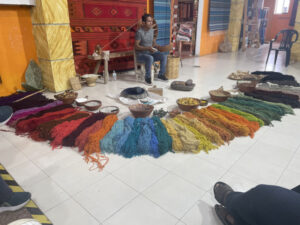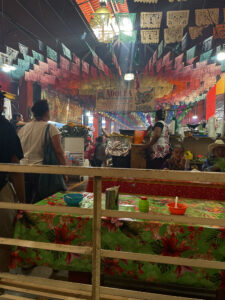Major: Geography & Environmental Studies
Post #1 – Pre-Departure – 5/21/25
Hi everyone,// Saludos a todos, my name is Bryan Castro-Velez, and I’ll be having the pleasure of sharing my upcoming experiences studying abroad with all of you!
The spring semester is finally coming to an end, and while it is the most relieving feeling ever to hit the “submit assignment” button for the last time, it also means I have to start packing immediately for travel.
Very soon, I will be having the privilege of traveling to Oaxaca City, Mexico for nearly three weeks and I’m not exaggerating when I say that it has been on my mind every single day since the semester started!
While this will be my first study abroad program at UMBC, it isn’t my first time traveling abroad. As a fun fact, I am a transfer student from CCBC, and my time there has led to some amazing study-away experiences across the East Coast here in the States! Even then, I come from a Honduran family and make it a goal to visit my relatives abroad as much as I can, so I can comfortably say that I’m accustomed to Latin American cultures and can get around with my native Spanish fluency despite the very obvious American accent.
Of course, every Latin American country is beautifully unique in their own ways, whether it be through dialects, food, or mannerisms, which I definitely look forward to as I’ll be immersed in an environment that is both familiar and unfamiliar.
For those who don’t know, Oaxaca City lies in the greater Oaxaca State of southern Mexico, facing the Pacific Ocean and being surrounded by the states of Guerrero, Chiapas, Puebla, and Veracruz. There is an array of breathtaking ecosystems across the land, but I have heard that the climate is generally dry (and hot, of course), which might be my only concern. Honduras has an incredibly humid climate all throughout, meaning that the hot, sticky humidity stays throughout the night with little change. While it does get uncomfortable, I like to think I’ve adapted well to being in that humid environment all the time. So, being in a dry climate where it does actually get colder at night means I have to be sure of what I’m packing, especially since I’m particularly sensitive to the cold as a result of toughing out raging humidity.
Although we’ll be with homestays and looking ahead in the neighborhood shows that it’s very walkable! There are stores, laundromats, cafes, and more all within walking distance – which I absolutely love since simply walking around is my favorite part of traveling and will definitely help out with being sun/heat smart. Luckily for me, my past experiences mean that I’m 80% sure I’ve got what I need to travel, but we’ll see when I actually start packing.
More on our homestay – they’ve offered to show us around, provide meals, and all sorts of generous things that I couldn’t be more than grateful for. I plan to bring a gift for my hostess as I especially look forward to conversing (y tal vez chismear) with her a lot. I’m more than confident that my host will be the perfect person to help me acclimate to Oaxacan culture and daily living!
Oaxaca State is also the ancestral home of Zapotec, Mixtec, Nahuatl, Huave, and many more Indigenous peoples of who have stewarded the land since time immemorial! The presence of several Indigenous cultures lives strongly within Oaxaca, promoting incredible linguistic diversity, food variety, intercultural relations, and so much more. This is why I am even more excited about this program, as our host institution, Ollin Tlahtoalli, is community-led and supports the livelihoods of Indigenous peoples through language-based teaching and learning. Through Ollin Tlahtoalli, we will be guest students building upon the focus of this faculty-led program by studying Climate Change in Context: Experiences of Resilience and Migration in/through Oaxaca, Mexico. It’s a great title for an even greater program, I know.
There will be several in-class lessons on food sovereignty, climate change and disparities, land and property, and more in the context of migration and Indigeneity. We won’t just only be inside the classroom! We got our itinerary solidified recently, and it’s looking like we will be out, from traditional medicine hikes to cooking experiences to interviews with local Indigenous organizers. This, coupled with the fact that it’ll be mango season when we arrive… I could explode with excitement.
I look forward to literally every aspect of this program, and I’m grateful to our two lead professors, Dr. Maggie Holland and Dr. Yolanda Valencia, the education abroad office, and Ollin Tlahtoalli for devoting their time to us students. The themes and works of this program are something incredibly important to me, academically and personally. I’m a Geography and Environmental Systems // Environmental Science major and a Public Humanities minor, in which I’ve dedicated much of my studies, aspirations, and work on decolonial conservation and land defense – working in solidarity with Indigenous peoples who are disproportionately impacted by climate-social issues. So, when Dr. Holland told me of this program, I instantly knew that this was the perfect program for me and what I aim to advocate for throughout my career, especially as my time at UMBC is coming to an end soon, with my senior year starting this fall.
Knowing that we will be learning directly from Indigenous folks in terms of how to best position ourselves in alliance with their wide array of interconnected/interdisciplinary work and advocacy is what solidified my efforts to be part of this experience, too. But academics aside, I believe my personal background helps me connect with this program even further. Coming from a community of migrants with intrinsic ties to the changing climate, I look to internalize these lessons and help spread word of connecting and allyship through the organization, some close friends, and I have officially started – the Indigenous Peoples’ Union. I don’t want to just drop in, learn, and leave, but rather give back directly and bolster firm solidarity for Indigenous communities abroad. I hope that those of you who are reading this will keep an eye out for our work and maybe even my future blog posts if you’re so inclined!
I’ve got a growing list of things to take care of before I leave soon, so I’ll definitely update everyone as soon as I land!
Cuidasen y nos vemos en Oaxaca!
Post #2 – In-Country – 5/30/25
Buenas días/tardes/noches/lo que sea!
It’s been almost a week since I’ve settled in Oaxaca now and I feel like a lifetime has passed already.
Everything has been going smoothly so far, though! My flights, first day, settling in, and all else has gone without issue thankfully. While we all had a long day of flying without any sleep whatsoever, we were picked up by members of Ollin Tlahtoalli, spent our first day meeting our host families and eventually scrounged up some energy to get to know the nightlife here.
We spent a while walking around the city before settling down a local rooftop restaurant that had the most gorgeous view of Oaxaca at night. We ate, chatted, ate some more, walked back to our home stays where we’d have to get back up not too much later. Overall, I’m grateful that our first day went as well as it did, both with our host families and our shared dinner, it definitely set the best possible tone for our program.
Latinos in general have a generous sense of hospitality, but I’ve been seeing that as a strong aspect of the unique Oaxaqueño culture here. When I first met my host mom, we greeted each other with a hug, and I was immediately asked if I was hungry. I, of course, said yes, and was given my first meal here – probably the best consome de barbacoa I’ve ever had. Since settling into her home, which is colorfully adorned with lots of art pieces, we’ve been having non-stop chats about food and culture.
My host mom is an amazing chef and is passionate about traditional foods/recipes, so we’ve been comparing the typical plates from both of our backgrounds. While there’s occasional overlap, it’s always interesting to see the differences in small things for me – such as black beans being the staple here whereas red beans are the staple in Central America. Simple differences, they definitely provides a window into Oaxaqueño culture and histories but also reminds me of what I consider to be home in Central America.
While I am a commuter and tend to walk a lot back in the states, walking here is definitely feeling different. I think I’ve only touched a car twice so far. Once when we were picked up from the airport and another to taxi to a meeting spot when I was running late – but even then, walking was still very much an option. Constant walking has definitely strained my back, but it only means that I need to start stretching more.
Heat hasn’t felt like so much of an issue for me, though! It’s been relatively cloudy and since the climate is relatively dry, it starts to cool very easily (especially at night). It still pays to be heat smart however, since air conditioning is not guaranteed (or common) in many buildings/homes here.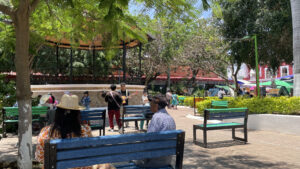
Our host school – Ollin Tlahtoalli – has definitely played the biggest role in helping us adjust to our new routine here and how to navigate as responsibly as we can.
Ollin Tlahtoalli is not a far walk from our home stays, only being around 10 minutes. They have a comfortable and charming building with a main conference room where we’ve been having various classes. So far, we’ve had 2 academic lectures and 3 Spanish-language classes in which myself and a couple of other classmates became impromptu tutors for.
Our learning here has been directed by Indigenous scholars/instructors who have shown incredible care and intention for how we connect with the complex topics we’re going through – on both sides of our academics/language-learning classes. I have been thinking about my position as a visitor to these lands and these communities since I first decided to join this study abroad program. Our instructors have thankfully been providing us with their guidances and critical perspectives on our short time here as students.
Our Spanish-language classes have been mainly introductory practice for beginner students while heritage-speakers/advanced students, including myself, were able to learn more about Oaxaqueño/Mexican colloquialisms that we often see and hear in conversations. But on the topic of mindful traveling – our third day of conversational practice took us to the weekly market in Zaachila. It’s a gorgeous collection of vendors from across neighboring communities that sell traditional crafts, herbs, drinks, fruits, pan dulce, and so much more! We were tasked to have a conversation with one of the tejate vendors – Carmen – who shared with us the story of this traditional drink and hers as a vendor. For those who don’t know, just as I didn’t until 10 hours ago, tejate is a traditional Zapoteca drink that is the ‘drink of the gods,’ having a maíz base and carrying mamey seeds, flor de cacao, and more ingredients that come together to make a refreshingly sweet drink.
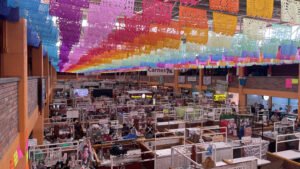 Of course I had to buy some tejate for my group and I to enjoy after we finished our lovely conversation with vendor Carmen. While our time with her was short, our conversation better connected us with the structure of community that the market represented as it was adorned with gorgeous arrangements of papel picado along the ceiling, honeybees attracted to the freshly made pan dulce, and a bustling environment of children running and playing as their families sold/bought fresh food to bring back home.
Of course I had to buy some tejate for my group and I to enjoy after we finished our lovely conversation with vendor Carmen. While our time with her was short, our conversation better connected us with the structure of community that the market represented as it was adorned with gorgeous arrangements of papel picado along the ceiling, honeybees attracted to the freshly made pan dulce, and a bustling environment of children running and playing as their families sold/bought fresh food to bring back home.
As we are simultaneously having academic lessons on the program’s theme – climate change, migration, Indigeneity, etc. – I couldn’t help but continue reflecting on these environments with what we were learning and my own positionality. As an American visitor, I am naturally made clueless to issues that are disadvantaging Oaxaqueños. But as a son to Honduran immigrants, I am very familiar with how systems can be flawed/harmful and how it drives people away from their native soil.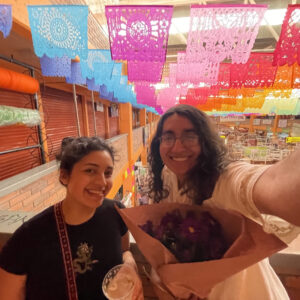
For example, while I have access to both cold/hot water provided by the state at home, I see that water, a necessity, has already become an inaccessible luxury both here and throughout Latin America. We learn how water scarcity and the privatization of water, of which may not even be available, is a byproduct of larger issues occurring in Mexico that is harming Black and Indigenous communities on a far greater scale.
As a visitor, I am able to afford traditional foods at my homestay and delicious meals at restaurants in the central part of the city – but I see the same vendors from markets and resident’s native to the region struggling to afford the same. I’m enjoying the gorgeous views of the surrounding mountains and murals that line the street on my routinely walk to Ollin.. but I still find myself questioning what the cost to my enjoyment really is. “How does this contradict narratives I’ve heard about Mexico before?” I think. “Does where I live have a connection to issues here?” I wonder.
We are still going through the introductory phase of our program, having brief overviews of the impact of neocolonialism, capitalism, gentrification, environmental extraction, and so much more that are beginning to provide the pieces for the bigger international picture here. I still continuously reflect on my position here, but through our tour/lessons/walks/conversations, I find myself wanting to transform that questioning into solidarity in light of Black and Indigenous-led movements growing in Oaxaca and the greater Mexican region. I hope that I can establish ways for bringing these sentiments back to UMBC and help not just inspire solidarity but encourage questioning to what we consider to be as true/simple.
Of course, I’ll be following the guidance of our instructors at Ollin, our professors, and my host mom to be sure I can understand the Oaxaqueño perspective as much as I can throughout my time. We’ve got a busy schedule filled with field-learning, reflections, and more ahead, so I look forward to keep sharing my thoughts and experiences with you all!
Cuidanse y nos vemos la próxima semana!
Post #3 – In-Country – 6/3/25
It’s nearly been two weeks since I have been in Oaxaca, which means that my time here will be coming to an end shortly. This study abroad program is only scheduled for 2 ½ weeks, and while it is a short time, it also means that our schedule has been packed nearly every day.
One of the challenges about studying abroad is the fact that you’re not just studying. You have to simultaneously juggle your traveling logistics, keeping up with your program’s schedules, manage your home responsibilities that may travel with you, and more all while you’re acclimating to a new environment and making sure you’re being as present and respectful as possible. It’s cause of this that I’m grateful for my previous experiences and heritage with Latin American cultures as it’s allowed me to quickly adapt to Oaxaqueño culture and society. Getting past surface-level culture shock quickly has helped tremendously in being further immersed in my education and experiences here – especially when we’re in a semi-fast paced program that has been taking us outside of our host classroom frequently.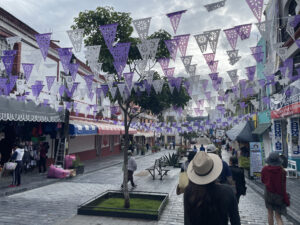
Some of the highlights since my last post have involved traveling (a.k.a driving for hours on end and ending up sore from sitting too long) to local communities within the state. So far, we have visited Nochixtlan, Tlaxiaco, Monte Alban, Tilcajete, and Cuajimoloyas. In each visit, we were hosted by community members that took time to teach us about their ancestral lands, practices, and contemporary relationships between communities and states. Throughout these experiences we were shown various forms of a traditional value that aids in the empowerment of Indigenous communities: Reciprocity.
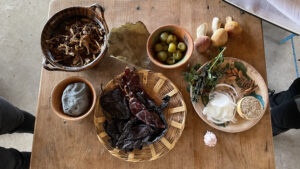 Reciprocity to us in the United States // Western world is interesting as we mainly think about it in the context of giving back to another person. Our hosts in these visits around Oaxaca state, however, embody reciprocity as a practice in their relationship to land as well.
Reciprocity to us in the United States // Western world is interesting as we mainly think about it in the context of giving back to another person. Our hosts in these visits around Oaxaca state, however, embody reciprocity as a practice in their relationship to land as well.
As reciprocity is an integral value of traditional Oaxaqueño culture, our professors took the lead in showcasing meaningful intentions by organizing a gift of abundance to our hosts on each visit. Often, they would receive a bottle of mezcal and a bundle of fruits from the local markets as a way of saying thank you. In return, our hosts showed with us the different forms in which these values take that empowers Indigenous communities and their cultural preservation.
In Nochixtlan, we learn about reciprocity through Indigenous agricultural practices that work to restore soil in the face of climate-change induced drought (you can learn more about this by looking up our host, Jesus Leon Santos – Goldman Environmental Prize winner). In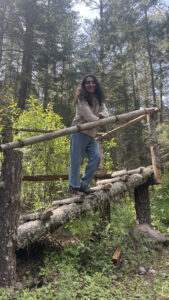 Tlaxiaco, a Mixtec women’s co-op embodied reciprocity through hosting physical space to support Indigenous women and their social, economic, and cultural livelihoods. Finally, in Cuajimoloyas, a community held the blueprint for what reciprocity through community-led ecotourism should look like, accepting foreign visitors whilst still being able to preserve cultural identity and prevent gentrification through a closed-loop economic system.
Tlaxiaco, a Mixtec women’s co-op embodied reciprocity through hosting physical space to support Indigenous women and their social, economic, and cultural livelihoods. Finally, in Cuajimoloyas, a community held the blueprint for what reciprocity through community-led ecotourism should look like, accepting foreign visitors whilst still being able to preserve cultural identity and prevent gentrification through a closed-loop economic system.
In these, I am reminded how beautiful the act of reciprocity is and how this value shapes Indigenous ways of being. I think this especially resonates with me as I notice that we, in the U.S./west, tend to only reciprocate with strings attached. Giving for the sake of not giving, but to wait for something bigger in return. I wonder why this is, but it’s likely because we are centered on profit-margins and integrate it as a value into our culture. Our hosts still have to worry about their community’s economic situation of course, seeing as it is a leading cause for migration, but, unlike us, I see that their cultural preservation, values, and practice are separate from economics. They value community, land, and people more than they value profit and thus exhibit a stronger sense of self than that of our communities in the states.
I’ll likely still be reflecting on this a lot once I’m back home, but I will certainly miss seeing these values as apart of the greater culture.
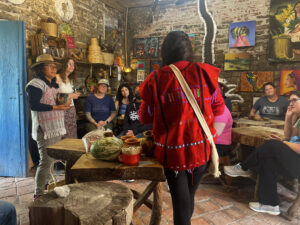 I believe I mentioned before that one of my goals is to not let my experience be contained within my actual time here. I like to think I’ve been doing well on that as part of our program, as you can see, takes us to develop relationships with various community leaders. Most recently, we connected with two organizers from Indigenous-led education organizations (Universidad Autonoma Comunal & EDUCA) that shine light as to any regional/national progress being the result of radical community-action. I’ve made it a point to remain connected with the folks from these organizations in order to foster solidarity between UMBC and Oaxaca, especially through the Indigenous Peoples’ Union. Even if you’re not apart of any organization, I would always recommend staying connected to the place you’ve studied at/traveled to in any way possible as the point of having these opportunities is to stay connected.
I believe I mentioned before that one of my goals is to not let my experience be contained within my actual time here. I like to think I’ve been doing well on that as part of our program, as you can see, takes us to develop relationships with various community leaders. Most recently, we connected with two organizers from Indigenous-led education organizations (Universidad Autonoma Comunal & EDUCA) that shine light as to any regional/national progress being the result of radical community-action. I’ve made it a point to remain connected with the folks from these organizations in order to foster solidarity between UMBC and Oaxaca, especially through the Indigenous Peoples’ Union. Even if you’re not apart of any organization, I would always recommend staying connected to the place you’ve studied at/traveled to in any way possible as the point of having these opportunities is to stay connected.
I don’t have much longer left in Oaxaca but that doesn’t mean our schedule won’t be packed till the last day! I’ll have to find a way to juggle buying last minute gifts, catching up on readings, writing out my reflections, taking in the sights one last time, and making sure everything fits back into my luggage. I’m sure I can manage, but the only thing that concerns me is the imminent reverse culture shock for when I return. I’ll speak more on that next time as it isn’t my first time dealing with this issue – but I’ll be taking more pictures and being as present as possible ‘till the second I leave!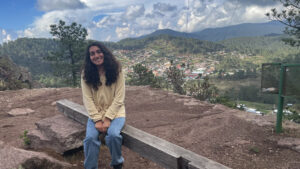
Thank you as always for reading and I’ll update again before I take off home!
Post #4 – In-Country – 6/11/25
Hi again, everyone!
The last few days have not been letting up on things to do whatsoever. Between class lectures, shifting schedules, field research, and much more, it’s been difficult to take things slow.
As a result – I’m currently writing while waiting at the gate for my flight. Our last official day went back and forth between assignments, last minute to-dos, sudden stomach issues, packing, and preparing for our farewell party. The party was hosted by our host moms and the staff at Ollin, who wanted to celebrate our time in Oaxaca and send us off with a grand, but warm, farewell.
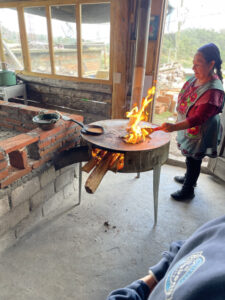 While I couldn’t eat any of the delicious food provided as a result of my plaguing stomach issue at the time, I spent the night enjoying being amongst friends that were once strangers to me. A night of eating, dancing, and laughing quickly turned into a series of teary-eyed speeches as we reflected on our time learning, loving, and giving back. We exchanged gifts amongst one another and embraced in warm hugs in preparation for our departure today, taking lots and lots of pictures and then quickly getting back into karaoke and dancing. While the party ended early, my roommate, our host mom, and I continued late into the night talking about all sorts of things as we still wanted to treasure our last moments.
While I couldn’t eat any of the delicious food provided as a result of my plaguing stomach issue at the time, I spent the night enjoying being amongst friends that were once strangers to me. A night of eating, dancing, and laughing quickly turned into a series of teary-eyed speeches as we reflected on our time learning, loving, and giving back. We exchanged gifts amongst one another and embraced in warm hugs in preparation for our departure today, taking lots and lots of pictures and then quickly getting back into karaoke and dancing. While the party ended early, my roommate, our host mom, and I continued late into the night talking about all sorts of things as we still wanted to treasure our last moments.
I’m still sitting here at my gate getting all emotional thinking about it. I feel that it’s especially difficult since I mentioned before that I adapted quickly to the environment here, meaning there was more time to develop deeper relationships between people and places throughout such a short time. It’s unlike the typical vacation when you visit somewhere new and you leave the moment you finally got used to the local environment and your new schedule.
This aside, some of the highlights since my last posts involve connecting with local Indigenous-led organizations. More specifically Servicios para una Educacion Alernativa A. C. (EDUCA) and Universidad Autonoma de Oaxaca (UACO), both who advocate for an alternative education system led on strengthening Indigenous pueblos and their movements.
It was incredibly interesting to compare Mexican and American domestic politics to understand how intricate the overlaps in a lot of different topics are. Not only that but being exposed first-hand to what an alternative education system can look like helps reflect on how my personal perspectives are influenced by the different institutions I grew up surrounded by. In this, we’ve seen how Oaxaca State is amongst one of the biggest sites for radical activism within the country, where a lot of national progress is made in leadership of pueblos here.
 This leadership is something I see all throughout the states as well, where the leaders who enforce real action, accountability, and justice are never those with higher statuses. Just as in Oaxaca, community leaders take the form of teachers, farmers, clerks, storytellers, and so much more, inspiring change all throughout. We learn from their work that leading action isn’t about status, but rather on comradery and comunalidad.
This leadership is something I see all throughout the states as well, where the leaders who enforce real action, accountability, and justice are never those with higher statuses. Just as in Oaxaca, community leaders take the form of teachers, farmers, clerks, storytellers, and so much more, inspiring change all throughout. We learn from their work that leading action isn’t about status, but rather on comradery and comunalidad.
Comunalidad is a way of life we learned about through our representative from Universidad Autonoma de Oaxaca, led by Jaime Martinez Luna. Comunalidad stands as a testament to the Indigenous ways of being and the formation of pueblos through mutuality, collectiveness, and respect to the land. According to Luna, he believes that while comunalidad comes from part of the natural human instinct to form communities, to share, and to be in relationship with the land, it also comes from a place of resistance against colonialism. In this I see reflections of how these principles, or rather ways of being, of/towards comunalidad have been what led for incredibly powerful movements in and out of the United States.
Coming across these different perspectives towards being like a breath of fresh air, though. In many of the markets you can find vendors trading with one another without the presence of a “formal” transaction or the Mexican peso. This was incredibly interesting for me as even in a lot of rural communities, while people may be connected to their Indigenous traditions and culture, there is still the presence of financial transactions dictated by currency. In these instances, though, many people sustain their families through traditional trading. It stands that a lot of these preservations of Indigenous ways of being and sacred customs are upheld by communities of Indigenous women, which is something familiar I had come to understand better through my time conversating within these vibrant market spaces.
For those who are interested in Mexican politics, which are intimately tied to that of the United States, I would highly suggest looking through Servicios para una Educacion Alernativa A. C. (EDUCA) and their frequent publishing! It’s one thing to consume news through social media and bigger news outlets, but intaking information through community-led organizations brings fresh perspectives on complex topics that I think anyone could benefit from.
Again, since this program is limited in time in comparison to other study-abroad programs, it means that we are consuming a lot of information at a rapid pace. Not only does it help bring new perspectives to our environments back at home, but it also rapidly recontextualizes everything we’re experiencing about Oaxaca. One day, we’re walking past a mural we may admire for a brief moment. That same evening, however, after a day’s worth of exposure, re-education, and experience, we’ll see that mural in a completely different light and spend hours thinking about it.
The Oaxaqueño environment is not static whatsoever, and I think that’s one of the things I’ll definitely miss about it. Things are constantly shifting and adapting to their surroundings, all while bearing no physical change. You may view the markets one way today but can come back as a different person tomorrow. You may view climate change or immigration one way today but can come back as a different person tomorrow. It matters most as to how you react to these dynamic environments. I’ve learned that you can either shift with things as a progressing person or remain in an outdated mindset.
It’s because of this that, out of everything, I will miss the Oaxaqueño people the most. Even though I may have already known a handful of these lessons, they still inspired me to be a part of these progressing changes and shifting dynamics through their love, laughter, generosity, resilience, and leadership.
I’m hearing some announcements about my flight, so I’ll have to stop there for this reflection before I start tearing up (again). I’m wishing myself steady travels back home (especially through customs) and will be back for my final reflection and update!
Post #5 – Return – 6/3/25
Hii everyone, this will be my last blog update I’ll have for you, so I’ll be doing my best to try and fit as much as I can!
First things first – I have never been happier at the fact that I bought trip insurance. I’m usually careful to ensure that I’m always insured one way or another, but I’m always bitter at having to spend more money just to not need it in the end. This time it really paid off, though. The only flights that go towards the states from the Oaxacan airport all go to Texas. And due to the surge of storms in the area, our flight was delayed more than 17 times. Eventually the airline just cancelled it and pushed it towards the next day – which would’ve been nice to do from the start as the consistent delays just kept giving us false hope that we were eventually going to leave soon.
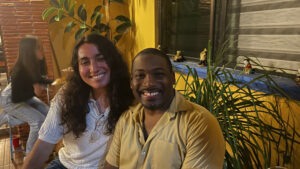 As we were trying to get back into a clear state of mind after the airline announced that, since the weather isn’t their fault, they couldn’t offer any hotel accommodations and offered one $200 peso meal stipend… We were able to find a local place to stay, and I coordinated our transport to/from the airport, so we weren’t stranded, thankfully – especially since we stayed in contact with our professors and the study abroad office. I’m currently in the middle of filing an insurance claim though since we were fully covered for the extra night we had to stay and all the expenses that came with it (booking, transportation, food, etc.).
As we were trying to get back into a clear state of mind after the airline announced that, since the weather isn’t their fault, they couldn’t offer any hotel accommodations and offered one $200 peso meal stipend… We were able to find a local place to stay, and I coordinated our transport to/from the airport, so we weren’t stranded, thankfully – especially since we stayed in contact with our professors and the study abroad office. I’m currently in the middle of filing an insurance claim though since we were fully covered for the extra night we had to stay and all the expenses that came with it (booking, transportation, food, etc.).
After a day’s worth of frustration, no sleep, and this stomach sickness I came down with (and still am dealing with), we spent our actual last night eating pizza in our hotel room and bonding over all the things we had experienced on the trip. It’s those nights that really make you feel closer with a group and even though it was the result of an expensive inconvenience, I’m actually really glad that that night was one of the last memories we made together — probably the best note we could’ve left off on.
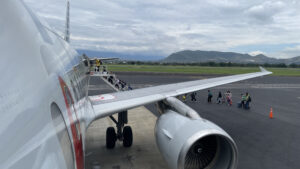 Now that I’m back, I’m dealing with the same problem I experience every time I come back from travelling – reverse culture shock. In Oaxaca, I got used to walking everywhere, passing daily markets that housed enriched histories, gorgeous murals, colorful buildings, and conversating with warm and sociable people. Back home, in the county where I live, I hardly get to be in that kind of environment (especially in terms of walkability). Baltimore will forever hold a special place in my heart though as the people here are just as warm, sociable, and kind as the people are at the places I’ve traveled to – so that in itself has kept me from missing being abroad too much.
Now that I’m back, I’m dealing with the same problem I experience every time I come back from travelling – reverse culture shock. In Oaxaca, I got used to walking everywhere, passing daily markets that housed enriched histories, gorgeous murals, colorful buildings, and conversating with warm and sociable people. Back home, in the county where I live, I hardly get to be in that kind of environment (especially in terms of walkability). Baltimore will forever hold a special place in my heart though as the people here are just as warm, sociable, and kind as the people are at the places I’ve traveled to – so that in itself has kept me from missing being abroad too much.
As for readjusting to the social climate back home, I can’t say I’m necessarily surprised at any of it. My group and I kept up with the news back home while abroad, partly because we needed to ensure we were prepared for anything relating to customs/reentry. But hearing some things from friends and family firsthand does tie everything back into what I studied abroad – which I’d like to share a snippet of with you all!
The timing of our return couldn’t be better as nearly every issue we’ve focused on learning throughout the program are visible now more than ever. Migration has been one of these key issues that has warranted on-the-ground organization across the nation in defense of vulnerable communities. I think we’re once again seeing why it’s necessary to understand the importance of critical media literacy and the ability to healthily question everything we do and consume, from information to ideologies.
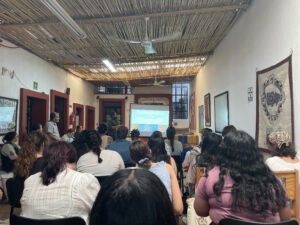 Throughout our program, we connected with local organizers that focused on the factors that push someone towards migrating to not just a different country, but even to a different, neighboring region. Nearly every person who migrates does so under unwilling conditions, experiencing difficult social/financial conditions that come with adapting to an unfamiliar – and even unwelcoming – region.
Throughout our program, we connected with local organizers that focused on the factors that push someone towards migrating to not just a different country, but even to a different, neighboring region. Nearly every person who migrates does so under unwilling conditions, experiencing difficult social/financial conditions that come with adapting to an unfamiliar – and even unwelcoming – region.
Throughout most of my life, I have consistently heard people ask loosely based questions on migration that require a much deeper understanding of international relations, geography, and critical sociology than one expects. These questions come in a variety of tones, from dissenting to well-meaning, and typically asks things like “why don’t they just stay in their country and work?” “why not just do it the right way?” and “why is it our problem?”
Again, migration is hardly a willing act that one commits to, as not only does it separate families, but it contributes to the disconnection and vulnerability that endangered cultures are experiencing. So, why migrate? I’ve seen in Oaxaca that instability is the leading factor that assumes every imaginable form possible.
Financial instability induced by a criminally low minimum wage (less than $9 USD/day), inaccessibility to secondary education, and workplace discrimination. Social instability induced by the legacy of the Catholic church that extracted natural resources and promoted harmful ideologies of machismo/marianismo. Environmental instability induced by climate change degrading soil through drought and American companies contaminating natural habitats through under-the-table deals. All this only being the surface of the actual reality many of us Americans are disconnected from.
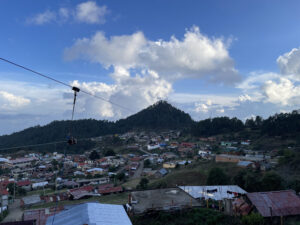 In terms of environmental instability, a somewhat newer issue in terms of relating to climate change, I have consistently seen the presence of American companies being involved. This is where I point the “why is it our problem?” question to, as it doesn’t end with the theft and degradation of sacred lands that ultimately forces communities to migrate, as a lot either lose their homes from natural disaster, land being out-purchased, or a growing inability to continue sustainably farming.
In terms of environmental instability, a somewhat newer issue in terms of relating to climate change, I have consistently seen the presence of American companies being involved. This is where I point the “why is it our problem?” question to, as it doesn’t end with the theft and degradation of sacred lands that ultimately forces communities to migrate, as a lot either lose their homes from natural disaster, land being out-purchased, or a growing inability to continue sustainably farming.
I’ve seen and learned how a lot of the brands that we adopt into our everyday lives have their fingerprints over a lot of the things migrant communities are blamed for… Coca-Cola (who has such a strong influence to where their soda has become cheaper than water), Chiquita, Apple, CISCO, and so many more have culpability in these issues, perpetrated further with the support of the United States government as a means to build profit.
Through all the natural reverse culture shock, all the immersion into these social issues has amplified this natural state I adapted long ago where I consistently question my surroundings and the conveniences we take for granted. The very same conveniences everyone has access to come at the expense of another community abroad, of which lies at the surface level of why it is ‘our problem.’
While I’ll always encourage anyone to build connections with your local organizers/mutual aid organizations (trust me, they’re always looking for people!), this is a study abroad blog and so I’ll offer my final bit of relevant advice for those who are planning to go abroad:
If there’s one thing that you should absolutely do while abroad, it’s volunteering.
Being a student abroad, believe it or not, takes an incredible amount of resources, time, energy, and space from the environment we study in – all to sustain our presence there. Considering my previous post about learned reciprocity, it’s important that we practice such beautiful values everywhere we go and not just at home, especially considering that our presence can do more harm than good if we are not intentional or mindful in our actions!
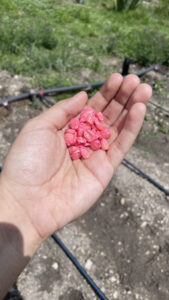 I believe I’ve shared before that my group and I helped our host in Nochixtlan, Jesus Leon Santos, to plant sacred food in a plot of land. In this, not only did we give back to the land and the community, but we established a meaningful connection that can last beyond the trip so long as we choose to nurture it.
I believe I’ve shared before that my group and I helped our host in Nochixtlan, Jesus Leon Santos, to plant sacred food in a plot of land. In this, not only did we give back to the land and the community, but we established a meaningful connection that can last beyond the trip so long as we choose to nurture it.
Volunteer your time and energy, just as others do for you, and stay connected to where you are studying. I speak from personal experience that your study abroad/away does not end when you come back home, so long as you nurture that connection.
I’m coming back from this program feeling incredibly enriched, grateful, and motivated to pursue my work now more than ever, especially because I built relationships with the people I met in Oaxaca that I intend to stay true to. I’m even considering following up on a potential grad school opportunity presented by one of these relationships!
But for now, I have a lot of catching up to do with my personal life and I’d like to take some time to organize all my notes/thoughts to see how I can incorporate a lot of what we learned into our plans for the Indigenous Peoples’ Union (look out for future announcements/events)!
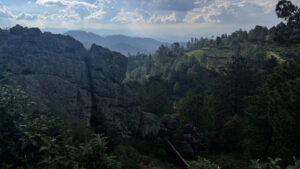 If you’re interested in learning more about anything I talked about in this blog series, whether it’s about studying abroad, local/Oaxacan community organizing, or anything else really, then I would be more than happy to take the time to have a chat! Just reach out and say hi!
If you’re interested in learning more about anything I talked about in this blog series, whether it’s about studying abroad, local/Oaxacan community organizing, or anything else really, then I would be more than happy to take the time to have a chat! Just reach out and say hi!
All in all, I hope reading my posts left you with something meaningful that can grow into something greater. But of course, I’m still grateful that you read this far, and I’ll always offer to be of any help that I can so that you can also pursue a transformative experience the same way I did (I promise it’s possible).
To finally close this off – if you see me around on-campus, then don’t be afraid to say hi please! Otherwise, thank you and I hope you all take good care of yourselves and your environment!

